
A birch is a thin-leaved deciduous hardwood tree of the genus Betula, in the family Betulaceae, which also includes alders, hazels, and hornbeams. It is closely related to the beech-oak family Fagaceae. The genus Betula contains 30 to 60 known taxa of which 11 are on the IUCN 2011 Red List of Threatened Species. They are a typically rather short-lived pioneer species widespread in the Northern Hemisphere, particularly in northern areas of temperate climates and in boreal climates.
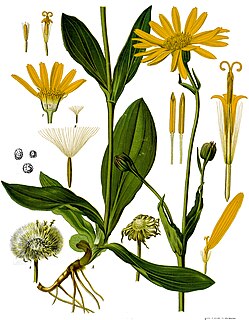
Arnica is a genus of perennial, herbaceous plants in the sunflower family (Asteraceae). The genus name Arnica may be derived from the Greek arni, "lamb", in reference to the plants' soft, hairy leaves. Arnica is also known by the names mountain tobacco and confusingly, leopard's bane and wolfsbane—two names that it shares with the entirely unrelated genus Aconitum.

Galium is a large genus of annual and perennial herbaceous plants in the family Rubiaceae, occurring in the temperate zones of both the Northern and Southern Hemispheres. Some species are informally known as bedstraw.
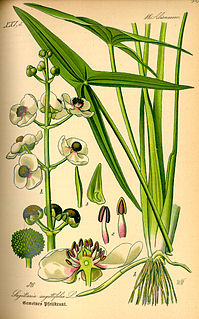
Sagittaria is a genus of about 30 species of aquatic plants whose members go by a variety of common names, including arrowhead, duck potato, katniss, Omodaka, swamp potato, tule potato, and wapato. Most are native to South, Central, and North America, but there are also some from Europe, Africa, and Asia.

Galium verum is a herbaceous perennial plant of the family Rubiaceae. It is widespread across most of Europe, North Africa, and temperate Asia from Palestine, Lebanon and Turkey to Japan and Kamchatka. It is naturalized in Tasmania, New Zealand, Canada, and the northern half of the United States. It is considered a noxious weed in some places.
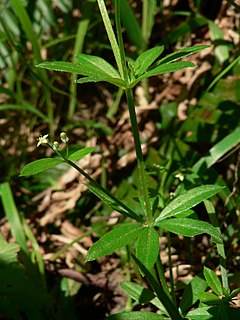
Galium triflorum is a herbaceous plant of the family Rubiaceae. It is widespread in northern Europe, eastern Asia and North America. The plant is considered a noxious weed in New York, Pennsylvania, Vermont, New Hampshire, Connecticut and Massachusetts.

Galium mollugo, common name hedge bedstraw or false baby's breath, is a herbaceous perennial plant of the family Rubiaceae. It shares the name hedge bedstraw with the related European species, Galium album.
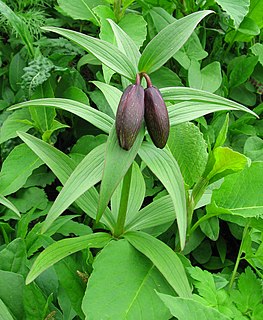
Fritillaria camschatcensis is a species of flowering plant native to northeastern Asia and northwestern North America, including northern Oregon, Washington, British Columbia, Alaska, northern Japan, and the Russian Far East. It has many common names, including Kamchatka fritillary and Kamchatka lily.

Mentha canadensis is a species of mint native to North America and the eastern part of Asia. In North America, it is commonly known as Canada mint, American wild mint, and in Asia as Chinese mint, Sakhalin mint, Japanese mint, and East Asian wild mint. The flowers are bluish or have a slight violet tint. The plant is upright, growing to about 4–18 in (10–46 cm) tall. Leaves grow opposite from each other, and flower bunches appear in the upper leaf axils. The mint grows in wet areas but not directly in water, so it will be found near sloughs, and lake and river edges. Plants bloom from July to August in their native habitats.
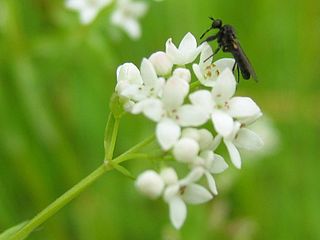
Galium palustre, the common marsh bedstraw or simply marsh-bedstraw, is a herbaceous annual plant of the family Rubiaceae. This plant is widely distributed, native to virtually every country in Europe, plus Morocco, the Azores, Turkey, Turkmenistan, Western Siberia, Greenland, eastern Canada, St. Pierre & Miquelon, and parts of the United States. The species is classified as a noxious weed in New York, Pennsylvania, Massachusetts, Connecticut, Vermont and New Hampshire. It is considered naturalized in Kamchatka, Australia, New Zealand and Argentina.

Galium boreale or northern bedstraw is a perennial plant species of the Rubiaceae family. It is widespread over the temperate and subarctic regions of Europe, Asia and North America including most of Canada and the northern United States.

Galium saxatile or heath bedstraw is a plant species of the genus Galium. It is related to cleavers.

Glyceria is a widespread genus of grass family common across Eurasia, Australia, North Africa, and the Americas.
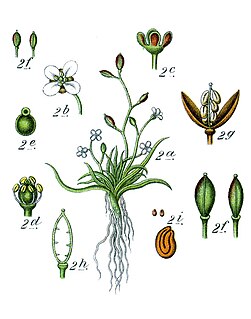
Subularia aquatica is an aquatic plant in the family Brassicaceae which is known by the common name water awlwort. This is a small herb with awl-like leaves, and growing from a corm above a network of bright white roots. Tiny flowers, each only about a millimeter long, are borne on stalks. Flowers which rise above the surface of the water open, while those that remain submersed stay closed and self-pollinate. The seeds come inside tiny inflated pods. There are two varieties of water awlwort; S. a. var. aquatica is native to Eurasia and S. a. var. americana is native to northern North America. There may also be a Mexican subspecies. This plant grows in ponds, marshes, peat bogs, and other shallow, cold water bodies, often in gravel or sand.

Vaccinium ovalifolium is a plant in the heath family having three varieties, all of which grow in northerly regions, including the subarctic.

Galium trifidum is a species of flowering plant in the coffee family, known by the common name three-petal bedstraw. It grows widespread in the arctic, temperate and subtropical regions of the Northern Hemisphere: northern and central Asia, northern and eastern Europe and much of North America.
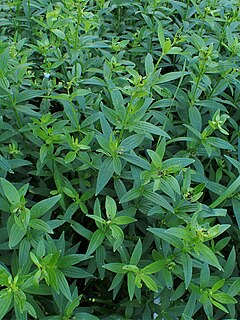
Galium rubioides is a species of plants in the family Rubiaceae, native to Europe and Asia. Natural distribution is from Austria and Croatia east to Russia and Turkey, plus the Caucasus, Western Siberia, Kazakhstan, northern China and the Amur region of Russia. The species is also reportedly naturalized in Northampton County, Pennsylvania.

Alnus alnobetula is a common tree widespread across much of Europe, Asia, and North America. Many sources refer to it as Alnus viridis, the green alder, but botanically this is considered an illegitimate name synonymous with Alnus alnobetula subsp. fruticosa.
Cirsium kamtschaticum, the Kamchatka thistle, is an Alaskan and East Asian species of plants in the tribe Cardueae within the family Asteraceae. The species is found in eastern Russia, and on certain islands of the North Pacific: the Aleutian Islands of Alaska and Hokkaido Island in northern Japan.

Platanthera chorisiana, Chamisso's orchid or Choris' bog orchid, is a terrestrial orchid native to the United States, Canada, Russia and Japan.



















